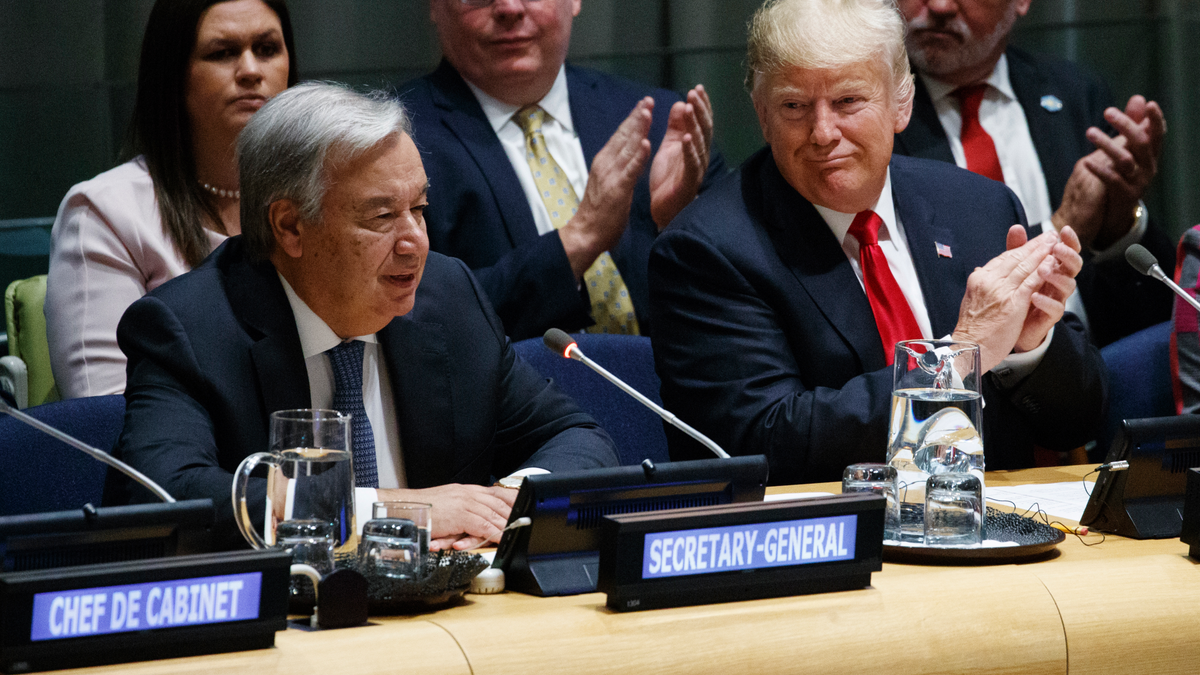
President Donald Trump listens as United Nations Secretary General Antonio Guterres speaks at the United Nations General Assembly, Monday, Sept. 24, 2018, at U.N. Headquarters. (AP Photo/Evan Vucci)
UNITED NATIONS – Secretary-General Antonio Guterres is expected to paint a grim picture of the state of the world when leaders open their annual meeting on Tuesday, spotlighting the breakdown of trust around the globe and the need to counter unilateralism and reinvigorate international cooperation which is the foundation of the United Nations.
U.N. deputy spokesman Farhan Haq gave a preview Monday of the U.N. chief's address saying he will "also sound the alarm on climate change" and stress that all people must benefit from new technologies "while safeguarding against the dangers from malicious acts in cyberspace to the weaponization of artificial intelligence."
Guterres will also appeal to world leaders "for greater solidarity in advancing peace, human rights and sustainable development," he said.
This year, 133 world leaders have signed up to attend the General Assembly session which ends on Oct. 1, a significant increase from the 114 leaders last year. Virtually all 193 U.N. member nations will be represented, many of the rest by ministers.
Ahead of the meeting, the secretary-general has been speaking out against the rise of populism and — as Haq said — underscoring "the need to reform, renew and reinvigorate multilateralism at a time when it has never been needed more."
Populist leaders attending this year's meeting including U.S. President Donald Trump, Poland's President Andrzej Duda and Italy's Premier Giuseppe Conte along with the foreign ministers of Hungary and Austria.
U.S. Ambassador Nikki Haley told reporters last week that Trump, who champions an "America First" policy, wants to talk about "protecting U.S. sovereignty" when he addresses the assembly shortly after Guterres.
"It is not saying multilateralism can't work," Haley said, "but it's saying sovereignty is a priority over all of that, and we always have to make sure we're doing that — and there are many countries that agree with us."
China's Foreign Minister Wang Yi warned at Monday's U.N. "peace summit" honoring the 100th birthday of South African anti-apartheid campaigner Nelson Mandela that "unilateralism and protectionism are on the rise."
He likely had Trump in mind since the U.S. and China have been engaged in a trade war in recent months, with the two sides imposing higher tariffs on imports from each other.
Wang said "the U.N. is the symbol of multilateralism" and he urged the international community to "stand united under the umbrella of multilateralism, uphold the central role of the U.N. in international affairs, and provide more predictability and stability in this turbulent world."
In speeches and close to 350 meetings on the assembly sideline, the conflicts, hotspots and issues contributing to that turbulence will be debated.
The seven-year-old conflict in Syria and the three-year war in Yemen that has sparked the world's worst humanitarian crisis and is now seriously threatening large-scale famine are certain to be in the spotlight along with African hotspots including Libya, South Sudan, Central African Republic, Mali and Congo.
French President Emmanuel Macron is expected to be a key voice joining secretary-general Guterres in speaking out against unilateralism and populism, and supporting multilateralism as key to promoting peace.
Macron is scheduled to address the assembly Monday along with Turkey's President Recep Tayyip Erdogan and Jordan's King Abdullah II.
Iran's President Hassan Rouhani, whose country has been a target of escalating U.S. accusations over its nuclear and missile programs and international terrorist activities, is also on Tuesday's speakers list. Iran vehemently denies any nuclear ambitions or involvement in international terrorism.
In speeches and close to 350 meetings on the assembly sideline, the conflicts, hotspots and issues contributing to that turbulence will be debated.
The United States, which holds the rotating presidency of the U.N. Security Council in September, has scheduled two meetings, one chaired by Trump on Wednesday which was initially to focus on Iran but has now been broadened to the topic of "nonproliferation" of nuclear, chemical and biological weapons.
The second Thursday chaired by U.S. Secretary of State Mike Pompeo is on North Korea, the one major issue where there is a glimmer of hope for progress. The 15 council nations have been united in imposing increasingly tough sanctions to try to rein in Pyongyang's nuclear program. But that unity now appears to be at risk over enforcement of sanctions and the broader issues of how to achieve denuclearization of the Korean peninsula, and when sanctions should be lifted against North Korea.







































